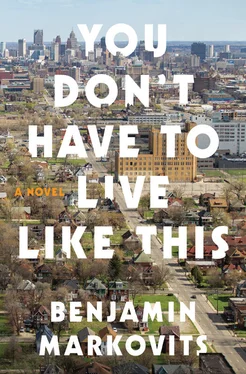His name was Mel Hauser and Tony said, “Marny here is about to move into a house on Johanna Street. I thought maybe you could give him some advice.”
“Does he have a gun?”
Mel wore a fishing vest and camouflage pants; his head was balding and grizzled, and even in this mostly smooth state not particularly clean. There were liver spots on it and scabs of dry skin. But his manner was straightforward and attractive.
I said, yes, I bought a shotgun from Walmart, on the drive up from Baton Rouge.
“Don’t let the first time you fire it be the first time you need it. Have you played around with it any?”
“No.”
“I tell you what. Sometimes I hang out at the academy on Linwood Street. A lot of retired cops still use the canteen. There’s a shooting range there, and if you want, I’ll book you in. Where do you keep it? Have you got a license?”
“In my car. No.”
“I can help you out with that, too.”
Then Cris came in with the kid half asleep in her arms. He’d conked out on the drive back from Clarkston, and she carried him into his room and fussed around noisily in the dark to get him down for his nap. The three of us listened to her singing for a while — her voice had been trained by ten years of Catholic school. I guess she knew we could hear her. Eventually Mel said, “All right, all right,” and pushed himself up with his hands on his knees and walked out, taking with him the rest of the six-pack. Afterwards Tony gave me a ride back into the city.
“Mel’s okay,” Tony said, “and I’ll tell you something you don’t want to hear. The reason our neighborhood works is that everyone’s white. Except for Raymond Chu, who happens to be our family doctor, and Amit Patel. Amit went to Michigan and works at the Chrysler design lab. Both are middle-class professional types. These are the people who are taking over our block. Mel’s old-school Eastpointe, but the reason he doesn’t mind is because of guys like me, working-class white guys who moved up in the world, and because guys like Amit and Raymond have to fit in with everyone else and not the other way around. You can’t be a cop in this city for as long as Mel was and not pick up some racial information. And don’t expect me to say that some of my best friends are black. My best friends aren’t black, and there’s a reason for that. I know some brothers, and like a few, too, but there’s a point beyond which I don’t really understand or trust them, and to be honest, the black guys I respect are the ones who feel the same way about me.”
“I don’t know why you’re telling me all this,” I said.
“How many black kids grew up on your street in Baton Rouge?”
“You know the answer to that.”
“I want you to realize what you’re getting into. Detroit is a black city. They don’t want you living there.”
I GOT MY FIRST REAL taste of this fact a week later, just a couple of days before moving into Johanna Street. I wanted to spend a night in the house before Walter came down, just to prove that I could. This was around the turning corner of May/June. The weather was cool and sunny, with tall clear skies, good roofing weather, and I spent that last week in work boots and overalls, supervising the Mexicans I brought in at the last minute to help me finish the job.
The Mexicans probably need some explanation. By this point Robert had signed off on the first group of bidders, a network of Latinos, spanning classes and generations and even nationalities. There were families waiting over in Windsor for their visas to come through and lots of back-and-forth traffic across the water. (Canada was softer on immigration.) Part of the deal Robert struck with these people had to do with the fact that they promised to bring skilled labor to the project — painters, carpenters, contractors, electricians, plumbers, roofers and gardeners, who offered to help out on other sites when they could. Their own neighborhood was about twenty blocks north of Johanna Street, towards Hamtramck, and you could hear the sounds of hammer, mower and drill as far as Gratiot. Anyway, a bunch of these guys showed up to lend me a hand.
I met Hector Cantu, who put their bid together, a short, baby-faced dude with thick black hair cut in a Ken-doll perfect haircut. He was maybe forty years old and had left a pretty good job at J. P. Morgan to set all this up. His people worked hard and gave us time to talk together. There was a Spartan grocery store about five blocks away, run by some Iraqi guy, and we often walked over together to bring back coffee and hot dogs for the men. Hector was a good organizer, planner and fund-raiser, but the kind of work he was good at wasn’t the kind that dirtied your hands. So I kept him company some, and we watched his buddies sweat.
They laid roof tiles and bathroom tiles and plumbed the kitchen to fit a dishwasher. They laid down grass. They painted the outside walls, where I couldn’t reach, in white and green. They rewired the living room and fixed the connection to the Detroit grid, which involved shutting down the street for several hours while they dug up road. It occurred to me that none of this would have happened if Robert James weren’t my particular pal. Sometimes Hector and I stopped at one of the few bars still open on East Vernor and had a beer. He was one of these confessional types, always in a good mood, and I heard a fair chunk of his life story.
What Hector wanted to talk about was New York, where he used to work about ninety, a hundred hours a week just to pay the rent on a one-bedroom apartment in Alphabet City. He ate out every night and got drunk on Saturday so he could sleep in Sunday and start the whole week up again on Monday morning, like some cranky old car.
All this was “about a million miles” from the world he came from. He grew up in Farmers Branch, Dallas County. His mother worked in a grocery, where she also cooked, and his father mowed rich men’s yards. His whole life long he was this scared nerdy cat who hung around a bunch of crazy kids, mostly friends of his big sister and cousins and friends of cousins. They were better at having a good time than he was but put up with him anyway. Then he got a scholarship to Rice, where he minored in business studies because he wanted to be the guy “who paid my father to mow his lawn and not the guy on the John Deere.” At one point a couple of years ago he realized that the only time he had any interaction with the kind of people he grew up with was when he ordered in and the restaurant sent somebody over with his bag of food.
Was he happy? He wasn’t unhappy. He had a good job and money to spend on himself. He sent money home, too, and bought his father for his sixtieth birthday a 1987 Mercedes 190E, with wood-panel trim. His father liked messing around with engines on the weekend. Sometimes when he went to bars tall white girls paid attention to him because of the way he dressed. But there was nobody he thought, you could be a mother to somebody, “a mother like mine.” And eventually he realized (this is what he told me), you have been blessed with many talents and gifts, and out of all this blessing and good luck, this is the life you have made. “This stupid life. That’s what I felt. I wanted to start from scratch.”
He had a disturbing habit of using language from Robert’s website. People who talk a lot eventually run out of their own thoughts and phrases and have to borrow materials from other sources. Not that he cared. He was one of those people whose smile says nervously, Life is good. I realized soon enough that none of his Mexican buddies respected him. They liked him okay but thought he had his head up his ass or in the clouds. The jobs they sent us on were the kind we couldn’t fuck up, like buying hot dogs.
When Angelo, one of the electricians, had to shut off the electricity on the street, he told me and Hector to explain what was happening to the neighbors. So we walked down the road together, knocking on doors.
Читать дальше












